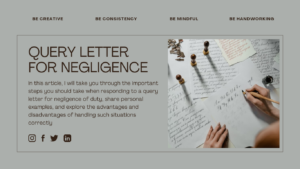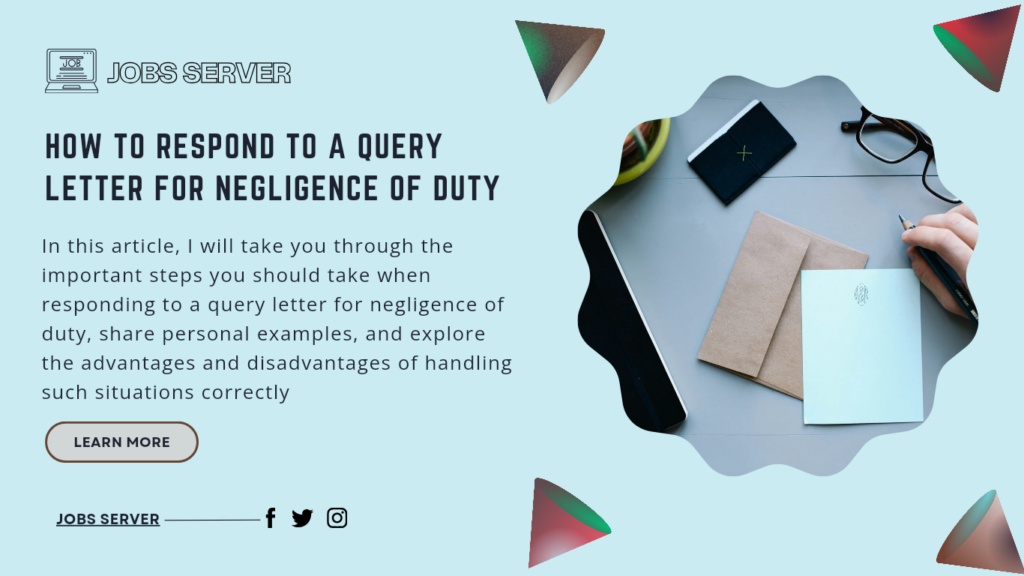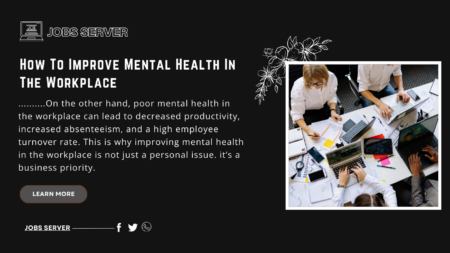How To Respond To A Query Letter For Negligence Of Duty
INTRODUCTION
Receiving a query letter for negligence of duty can be an intimidating experience. For many people, it’s a formal reminder that their actions, or inactions, have been noticed and that there’s now an obligation to respond. Witting the right response is crucial, as it can have a significant impact on your professional reputation and even your job security.
In this article, I will take you through the important steps you should take when responding to a query letter for negligence of duty, share personal examples, and explore the advantages and disadvantages of handling such situations correctly. You’ll learn how to frame your response in a way that shows responsibility, respect, and commitment to improvement, and how this can turn a negative situation into an opportunity for growth.
THE IMPORTANCE OF A QUERY LETTER
A query letter is a formal document issued by an employer to address issues of concern. Negligence of duty is often considered a serious offense in many workplaces. It might define as a failure to fulfill responsibilities or duties that are part of your role. This could involve anything from missing deadlines, failing to complete assigned tasks, or not adhering to workplace protocols.
Responding to such a letter is important because it’s your chance to provide clarification or rectify misunderstandings before the situation escalates. Your response, if done thoughtfully, can make a huge difference in how the issue is perceived by your employer. It can show that you are professional, willing to learn from your mistakes, and are committed to doing better.
- ALSO CHECK:
- How To Stay Motivated In A Long-Term Career
- How to Know If Your Social Skills Are Bad
- How To Develop Leadership Skills In Employees
- How to Empower Aspiration in the Workplace
STEP-BY-STEP ON HOW TO RESPOND TO A QUERY LETTER FOR NEGLIGENCE OF DUTY
Below are detailed steps on how to properly respond to a query letter for negligence of duty, that will ensure that you address the concerns raised while also protecting your professional integrity.
1. Read The Query Letter And Understand It Thoroughly
Your first reaction upon receiving a query letter may be emotional, whether it’s frustration, anxiety, or anger. However, before responding, it’s crucial to take a deep breath and read the letter thoroughly. Ensure that you understand exactly what the accusation is. Are they claiming that you missed a specific deadline, failed to complete a task, or neglected other responsibilities? Pay close attention to details such as dates, times, and examples of your alleged negligence.
There was a time I once worked in an administrative role where I missed a critical meeting due to a calendar oversight. I received a query letter, and my initial response was frustration because I felt I wasn’t given a reminder. However, when I reread the letter, I realized that I had received several notices about the meeting and overlooked them. It made me reflect on my level of responsibility.
2. After Reading The Latter, You Need To Stay Calm And Neutral
Once you understand the contents of the letter, it’s important to keep a calm and dispassionate attitude. Even if the accusation feels unfair or exaggerated, a defensive or emotional response will not help your case. Maintain a professional tone throughout your response.
3. You Need To Acknowledge The Concern Raised
It’s essential to acknowledge the concerns raised in the letter, whether or not you agree with them. This demonstrates that you are taking the matter seriously. Even if you believe you did not commit the act of negligence as described, it’s important to address the issue respectfully.
For example, you could say, “I appreciate the opportunity to respond to this concern regarding my duties on 2 September 2020.”
4. You Need To Provide A Clear Explanation
If there were legitimate reasons for the alleged negligence, explain them straightforwardly and respectfully. Was there a misunderstanding? Were you dealing with unforeseen circumstances, such as personal emergencies or technical issues? If you simply overlooked something, it’s better to admit that mistake than to shift blame. Own up to your role in the situation and be honest.
In the administrative role I mentioned earlier, I responded by admitting that I had indeed received reminders about the meeting but had failed to properly manage my schedule. I explained that I had recently transitioned to a new scheduling software, which contributed to the confusion. However, I took full responsibility and outlined the steps I was taking to ensure it wouldn’t happen again.
5. You Need To Offer Solutions Or Corrective Measures
An important part of your response is to outline what steps you plan to take to rectify the situation and prevent it from happening again. This shows your employer that you are proactive and committed to improvement. Suggest specific solutions that are reasonable and actionable, such as setting reminders, improving time management, or attending training programs to improve your skills.
For instance, you could say, “To ensure that I stay on top of my responsibilities moving forward, I have started using project management software to track deadlines and priorities.”
6. Be Respectful And Professional When Offering Solution
Remember that your tone matters. It’s easy to come across as defensive, dismissive, or insincere if you’re not careful. Always maintain a respectful and professional tone, even if you feel the accusations are unfounded. Your response letter should reflect your professionalism and willingness to cooperate.
7. Proofread Your Response
Before sending your response, make sure to review it for any grammatical or spelling errors. A polished response shows attention to detail and reinforces your professionalism. It also demonstrates that you’re serious about your role and the concerns raised.

ADVANTAGES OF RESPONDING THOUGHTFULLY TO A QUERY LETTER
There are many advantages to responding thoughtfully and professionally to a query letter for negligence of duty: Below Are Some Of Them
1. It Will Protects Your Professional Reputation
Responding well can protect your reputation in the workplace. It shows your employer that you take their concerns seriously and that you are willing to improve, which can help maintain their trust in you.
2. It Will Open up Opportunities for Personal Growth
A well-thought-out response can lead to personal growth. By reflecting on your actions and identifying areas where you can improve, you set yourself up for future success in your role.
3. It Will Keep The Situation From Escalating
A poorly written or defensive response could escalate the issue, leading to further disciplinary actions. A calm, professional response, on the other hand, may resolve the issue quickly and amicably.
4. It Demonstrates That Your Accountable
Admitting mistakes and offering solutions shows that you are accountable. Employers appreciate employees who take responsibility for their actions and work towards improvement.
DISADVANTAGES OF POORLY HANDLING A QUERY LETTER
Failing to handle a query letter properly can have serious consequences, both for your professional standing and your career prospects:
1. It Will Damages Your Reputation
If you respond poorly or fail to respond at all, it can damage your reputation with your employer. They may perceive you as someone who doesn’t take responsibility for their actions, which can affect your future career opportunities within the organization.
2. It Sometimes Leads to Disciplinary Actions
A defensive or inappropriate response could lead to more serious consequences, such as formal warnings, demotion, or even termination of employment.
3. You Can Missed Opportunity for Improvement
Neglecting to take the issue seriously means missing an opportunity to learn and grow from the experience. By reflecting on what went wrong and how you can do better, you can prevent similar situations from happening in the future.
FINAL THOUGHTS
Responding to a query letter for negligence of duty is a delicate task, but it’s an opportunity to demonstrate your professionalism, accountability, and commitment to improvement. By carefully considering your response, taking ownership of your actions, and proposing constructive solutions, you can turn this potentially negative situation into a stepping stone for growth.
In the end, no one is perfect, and we all make mistakes. What matters is how we choose to respond to those mistakes and learn from them. Whether you are working from home or in an office environment, showing that you can handle responsibility and correct errors will help you thrive in any professional setting.
SOME ASKED QUESTIONS ON HOW TO RESPOND TO A QUERY LETTER FOR NEGLIGENCE OF DUTY
- What is the best way to respond to a query letter for negligence of duty?
The best way to respond is to stay calm, acknowledge the concern, and explain the situation clearly. Be honest about any mistakes, and offer practical solutions to prevent them from happening again. Always maintain a respectful tone.
- How can I admit my mistake in a query response without damaging my reputation?
Admitting a mistake can improve your reputation if done right. Own up to the error, explain why it happened, and show that you’re taking steps to correct it. Employers appreciate accountability.
- What should I avoid when responding to a query letter?
Avoid being defensive or blaming others. Don’t ignore the issue or minimize it. Instead, focus on providing clear explanations and solutions, while maintaining a professional tone throughout.
- Can I apologize in my response to a query letter for negligence?
Yes, apologizing can be a strong part of your response. A sincere apology shows responsibility. Just ensure it’s followed by a commitment to improve and prevent future issues.
- How long should my response to a query letter be?
Your response should be concise but detailed enough to address the concerns raised. Aim for clarity—two to three paragraphs are usually sufficient to explain, apologize, and offer solutions.
- What if I disagree with the claims in the query letter?
If you disagree, stay respectful. Explain your side of the story with supporting facts, but avoid being argumentative. Clarify any misunderstandings without sounding defensive.
- Should I suggest corrective actions in my query response?
Yes, offering corrective actions shows you’re proactive. Suggest steps you’ll take to prevent future mistakes, such as better time management or using tools to track tasks.
- Can responding properly to a query letter improve my standing at work?
Absolutely! A well-thought-out response shows maturity and professionalism. It could even build trust with your employer by demonstrating your commitment to growth and improvement.
- How soon should I respond to a query letter?
Respond as quickly as possible, ideally within 24 to 48 hours. This shows that you are taking the issue seriously and are willing to address it promptly.
- What tone should I use in my response?
Your tone should be respectful, professional, and sincere. Even if you’re upset or feel the claim is unfair, a calm tone will help de-escalate the situation and reflect well on you.





